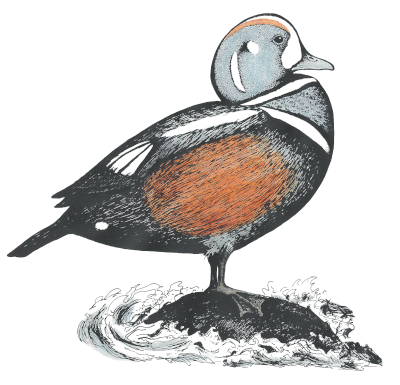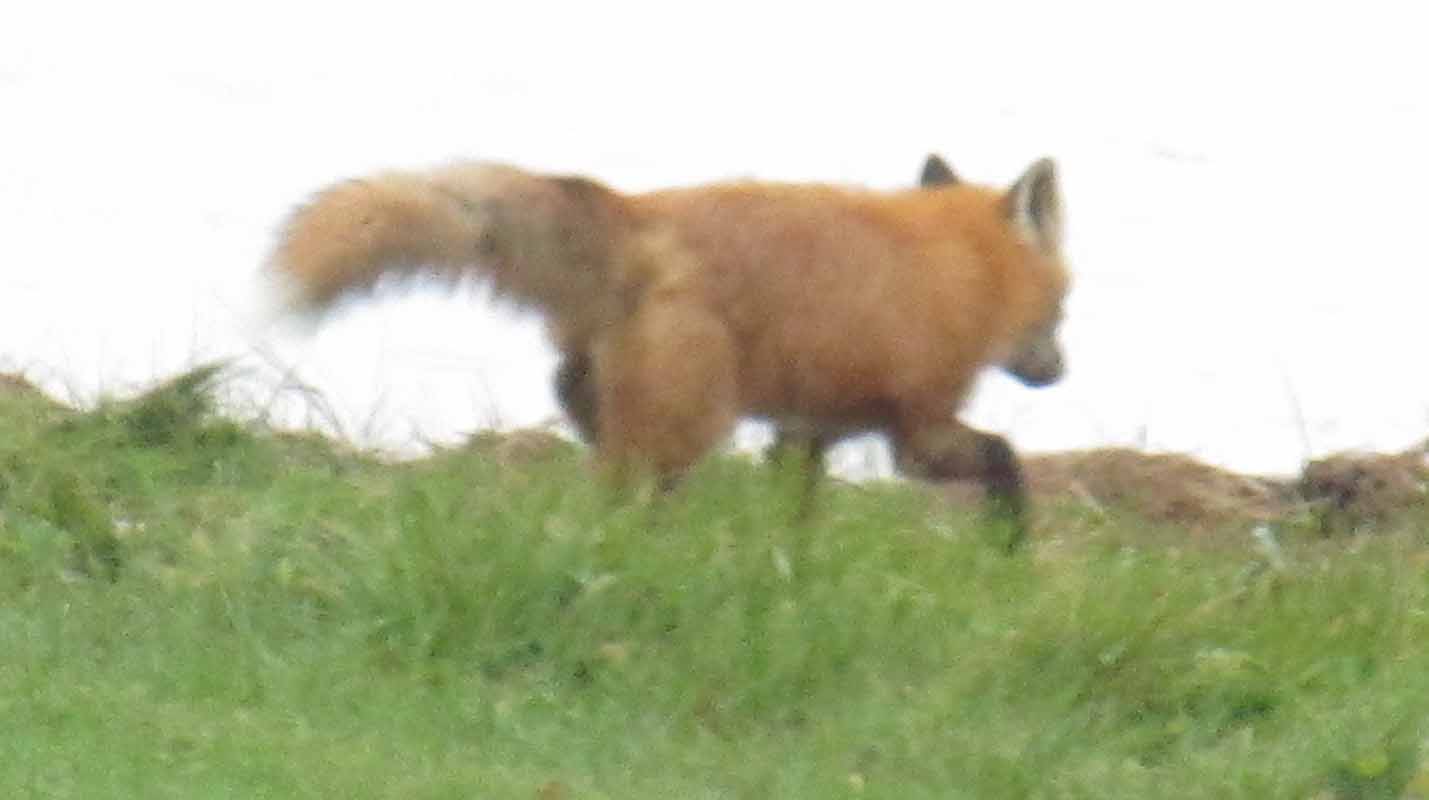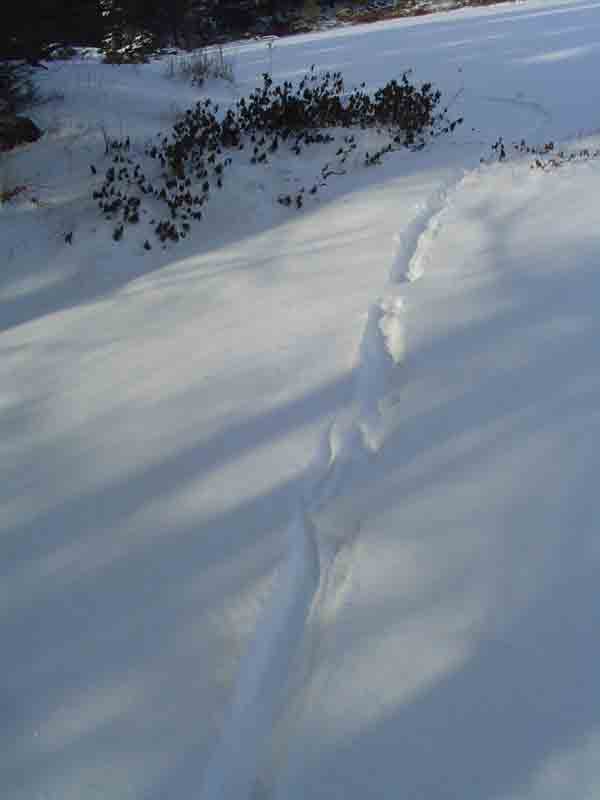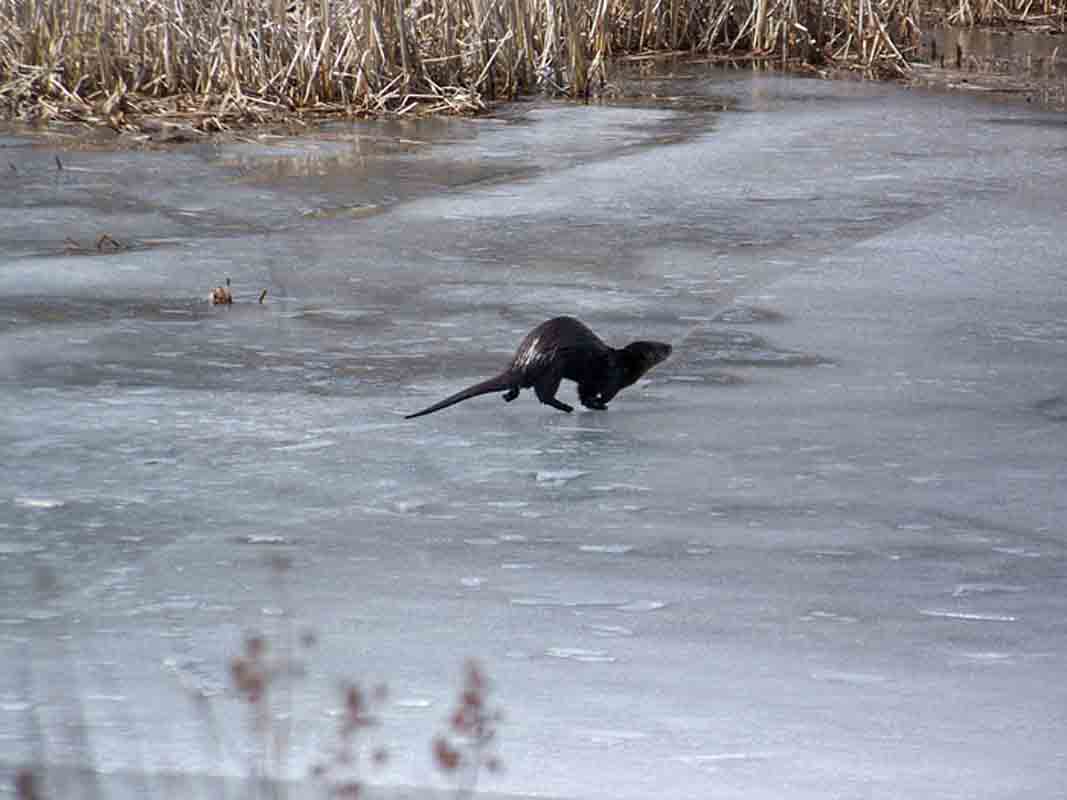
Maine and the adjacent ocean are home to 16 species in 13 genera in 7 families.
If you know which species you have or are interested in learning about, click on the appropriate species link below. Otherwise, to determine which family the animal that you are trying to identify belongs to, refer to the tabular key immediately below the species list.
Family Canidae (3 genera, 3 species)
Canis (1 species)
Canis latrans - coyote
Urocyon (1 species)
Urocyon cinereoargenteus - gray fox
Vulpes (1 species)
Vulpes vulpes - red fox
Family Felidae (1 genus, 2 species)
Lynx (2 species)
Lynx canadensis - Canada lynx
Lynx rufus - bobcat
Family Mephitidae (1 genus, 1 species)
Mephitis (1 species)
Mephitis mephitis - striped skunk
Family Mustelidae (4 genera, 6 species)
Lontra (1 species)
Lontra canadensis - river otter
Martes (2 species)
Martes americana - American marten
Martes pennanti - fisher
Mustela (2 species)
Mustela erminea - short-tailed weasel
Mustela frenata - long-tailed weasel
Neovison (1 species)
Neovison vison - mink
Family Phocidae (2 genera, 2 species)
Halichoerus (1 species)
Halichoerus grypus - gray seal
Phoca (1 species)
Phoca vitulina - harbor seal
Family Procyonidae (1 genus, 1 species)
Procyon (1 species)
Procyon lotor - common raccoon
Family Ursidae (1 genus, 1 species)
Ursus (1 species)
Ursus americanus - black bear
Key to the families of Order Carnivora in Maine
| habitat | color(s) | toes on front feet (number) |
toes on hind feet (number) |
char. 5 | |
| Canidae | land | 4 (the 5th toe is part way up the canid’s leg) |
4 | ||
| Felidae | land | 4 | 4 | ||
| Mephitidae | land | black with two dorsal white stripes | 5 | 5 | |
| Mustelidae | land, freshwater |
5 | 5 | ||
| Phocidae | ocean | n/a | n/a | ||
| Procyonidae | land | grayish with black “mask” and black bands on tail | 5 | 5 | |
| Ursidae | land | black, sometimes brownish |
5 | 5 |
Family Canidae (dog family)
[information to be added]
Key to the genera of family Canidae in Maine
| color | char. 2 | char. 3 | char. 4 | char. 5 | |
| Canis | |||||
| Urocyon | |||||
| Vulpes | reddish |
Canis ([genus name?])
[information to be added]
Canis latrans (coyote) - [information to be added]
Urocyon ([genus name?])
[information to be added]
Urocyon cinereoargenteus (gray fox) - [information to be added]
Vulpes ([genus name?])
[information to be added]
Vulpes vulpes (red fox) - This red fox was photographed near the shore of Bass Harbor (Tremont). Nearby was a hind leg of a snowshoe hare (Lepus americanus).

(click on image to enlarge)
Felidae (cat family)
Lynx is the only genus in the Felidae in Maine.
Lynx (lynx)
[information to be added]
Key to the species of the genus Lynx in Maine
| ear tufts | tail tip | front feet L x W (inches) |
hind feet L x W (inches) |
Maine range | |
| L. canadensis | long | black above and below | 23/8–41/4 x 23/8–55/8 | 21/2–41/8 x 21/8–5 | extreme north and northwest (Aroostook, Piscataquis, and northern Franklin, Oxford, Penobscot, and Somerset counties) |
| L. rufus | short | black above, white below |
15/8–21/2 x 13/8–25/8 | 19/16–21/2 x 13/16–25/8 | statewide |
Lynx canadensis (Canada lynx) - [information to be added]
Lynx rufus (bobcat)


(photos by Ed Meadows; click on an image to enlarge)
Mephitidae (skunk family)
Mephitis is the only genus in the Mephitidae in Maine.
Mephitis (skunk)
Mephitis mephitis is the only species in the genus Mephitis in Maine.
Mephitis mephitis (striped skunk) - [information to be added]
Mustelidae (weasel family)
[information to be added]
Key to the genera of family Mustelidae in Maine
| char. 1 | char. 2 | char. 3 | char. 4 | char. 5 | |
| Lontra | |||||
| Martes | |||||
| Mustela | |||||
| Neovison |
Lontra ([genus name?])
Lontra canadensis is the only species in the genus Lontra in Maine.
Lontra canadensis (river otter) - From p. 140 of “Tracking & the Art of Seeing” by Paul Rezendes: “When otters move on snow, they tend to bound a few steps, then get down on their belly and slide, pushing themselves along with their short legs as though they were swimming. ... The slide is usually 6" to 10" wide.” The image of the slide (below left) was taken on 17 January 2008 at the pond that is north of Eagle Lake Road (Bar Harbor) and just east of the Eagle Lake parking lot. The picture of the river otter (below right) was taken by Don Lenahan on 27 March 2008 at the marsh along the west side of Schooner Head Road, from which there is a clear view of the east face of Champlain Mountain.


(click on an image to enlarge)
Martes ([genus name?])
[information to be added]
Key to the species of the genus Martes in Maine
| front feet (L x W in inches) | hind feet (L x W in inches) | char. 3 | char. 4 | char. 5 | |
| M. americana | 15/8–23/4 x 15/16–25/8 | 11/2–23/4 x 13/16–21/4 | |||
| M. penanti | 21/8–37/8 x 17/8 x 41/4 | 2–31/8 x 11/2–31/2 |
Martes americana (American marten) - [information to be added]
Martes pennanti (fisher) - [information to be added]
Mustela ([common name?])
[information to be added]
Key to the species of the genus Mustela in Maine
| tail length | char. 2 | char. 3 | char. 4 | char. 5 | |
| M. erminea | shorter than head+body | ||||
| M. frenata | longer than head+body |
Mustela erminea (short-tailed weasel) - [information to be added]
Mustela frenata (long-tailed weasel) - [information to be added]
Neovison ([genus name?])
Neovison vison is the only species in the genus Neovison in Maine.
Neovison vison (mink) - [information to be added]
Phocidae ([family name?])
[information to be added]
Key to the genera of family Phocidae in Maine
| char. 1 | char. 2 | char. 3 | char. 4 | char. 5 | |
| Halichoerus | |||||
| Phoca |
Halichoerus ([genus name?])
[information to be added]
Halichoerus grypus (gray seal) - [information to be added]
Phoca ([genus name?])
[information to be added]
Phoca vitulina (harbor seal) - [information to be added]
Procyonidae (racoon family)
Procyon is the only genus in the Procyonidae in Maine.
Procyon (raccoon)
Procyon lotor is the only species in the genus Procyon in Maine.
Procyon lotor (raccoon) - The lower left photograph was taken at a “bird” feeder one night in April 2007 at a private residence in Bass Harbor (Tremont). The lower right image shows the raccoon’s track in a natural habitat, the muddy edge of a small pond (9 September 2018).


(click on an image to enlarge)
Ursidae (bear family)
Ursus is the only genus in the Ursidae in Maine.
Ursus (bear)
Ursus americaus is the only species in the genus Ursus in Maine.
Ursus americanus (black bear) - [information to be added]